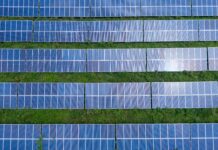Doug Young
Struggling solar cell maker Suntech (NYSE: STP) has just issued a euphemistically upbeat plan on how it intends to “solidify market leadership,” as it tries to return to health amid a prolonged industry downturn that has seen prices plunge more than 70 percent over the last 2 years. But investors are clearly focused on the last part of the plan, specifically discussing how the company intends to deal with nearly $600 million in convertible bonds that will come due in March next year. The process of renegotiating that debt is likely to be a long one, and is hardly guaranteed success without major support from Beijing and other government entities.
Before we look at the latest news, let’s take a broader look at Suntech and its debt. Unlike some of its peers that arrived later to the solar cell-making industry, Suntech once prided itself on its ability to fund its rapid expansion with money from financial markets as it sold investors on its vision of a future powered by solar energy. By comparison, weaker rivals like LDK (NYSE: LDK) funded much of their growth from state-backed sources, such as state-run banks that were usually more motivated by political factors such as pressure from local governments than from real commercial factors.
Now Suntech may be starting to regret its former hubris, as many of the private-sector investors who bought its $575 million in convertible bonds that will mature next March are hardly likely to be sympathetic when the company asks them to forgive a big portion of that debt. Suntech doesn’t provide much detail about what’s happening with the debt situation in its latest announcement, except to say that it has hired investment bank UBS to “to evaluate alternatives to address its convertible notes due March 2013.” (company announcement)
Observers are saying the process of renegotiating that debt is likely to be long and arduous, with no guarantee of success without some strong government support. In that regard, perhaps the signs are good since local governments are already starting to indicate they are prepared to provide the funding that solar companies within their jurisdictions need to avoid outright closure.
Suntech itself received an emergency $32 million loan from the city of Wuxi where it is based just a couple of weeks ago to keep operating. (previous post) Similarly, LDK also announced around the same time that some of its biggest creditors had agreed to delay their debt collection by a year, and I’m certain that most of those creditors were state-owned and clearly taking their orders from worried government officials. (previous post) At the national level, Chinese media have also reported that the central government is planning to assist in the rescue by providing emergency funding to around a dozen of the biggest players through the China Development Bank.
So, what exactly is likely to happen to the $575 million in debt that Suntech owes to international investors? My prediction is that investors, aware that Beijing doesn’t want to see Suntech fail, will take a relatively hard position on the debt repayment, perhaps demanding as much as 40 cents for each dollar of their investment. At the end of the day, they will probably have to settle for quite a bit less, perhaps 20-30 cents, and most of the funds for that repayment will have to come from a Beijing rescue package. Still, that kind of package, combined with big production and cost cuts at Suntech, could help the company survive for yet another year, perhaps even pushing its US-listed shares back above the critical $1 mark to help it avoid a de-listing.
Bottom line: Suntech will require a government rescue to help it avoid defaulting on $575 million in debt coming due in March, with investors likely to recoup 20-30 percent of their investment.
Doug Young has lived and worked in China for 15 years, much of that as a journalist for Reuters, writing about publicly listed Chinese companies. He currently lives in Shanghai where he teaches financial journalism at a leading local university. He also writes daily on his blog, Young’s China Business Blog, commenting on the latest developments at Chinese companies listed in the US, China and Hong Kong. He is also the author of an upcoming book about the media in China, The Party Line: How The Media Dictates Public Opinion in Modern China .






